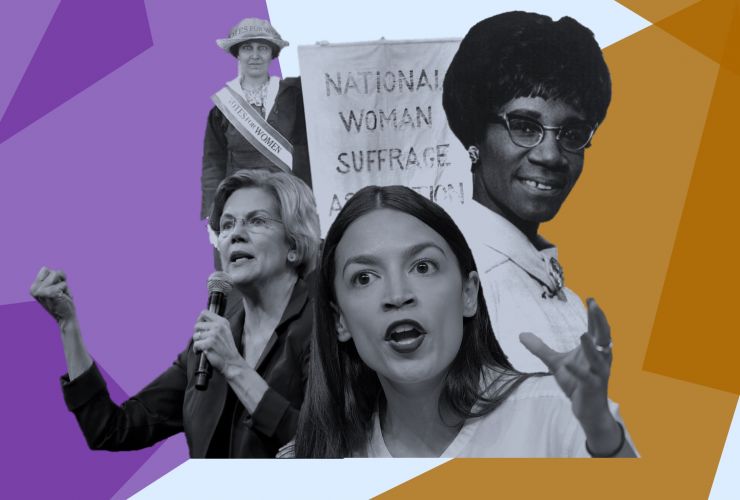Jennifer Piscopo argues that gender quotas in other countries work like the wave of a magic wand, quickly and profoundly correcting for women’s lack of political representation. So, why don’t we legislate quotas in the United States? Apart from the procedural hiccups Piscopo alludes to, there are social and cultural barriers—challenges that only slow, incremental changes can overcome.
In the United States, despite broad public support for the idea of equality—82 percent of men and 81 percent of women in a 2018 Pew poll endorsed “having about an equal number of women and men” in high political offices—not one of the candidates vying for the Democratic presidential nomination in 2020 has proposed quotas, nor did the Democratic Party platform of 2016. Something must be holding Americans back.
American values of individualism and individual freedom generally resist top-down governmental interventions. Most Americans believe that each person deserves the freedom to make her or his own decisions; they would certainly not want their voting decisions constrained by government quota rules. Americans also champion equality of opportunity and competition. These values imply that everyone should have the chance to run for office, regardless of their sex or race, and that candidates should compete, with voters choosing their favorites.
Given these values, many Americans do not object to the current male dominance of political offices. To this point, in the 2018 Pew survey, 43 percent of men and 26 percent of women indicated that the current representation of women in top leadership positions is “about right.” Many people, especially men, seem satisfied with the current representation of women, despite the shared ideal of equal representation. The logic, it seems, is that if a system of presumably equal opportunity and free choice produces inequality in representation, that result is all right.
Another aspect of quotas is troubling for many Americans: minorities’ demands for equitable political representation would surely have as much legitimacy as those of women. The resulting multiple quotas would greatly constrain election outcomes, and resistance and resentment would be intense, especially from white men who have the most to lose.
Numerical quotas would surely be challenged legally, just as racial quotas for college admissions have been challenged. In fact, the Supreme Court ruled in Regents of the University of California v. Bakke (1978) that public universities as well as other government institutions cannot set specific numerical racial quotas for admissions or employment. Later decisions in university cases have approved softer affirmative action policies that allow race to be considered among other factors, but it is doubtful that numerical quotas for women or minorities in political offices would pass the legal test of constitutionality.
Proactive measures such as quotas, then, have an exceedingly uphill battle. Without them, activists should continue to advocate for diversity and inclusion, using reasoned arguments and legitimate forms of political pressure. They should raise money to support female candidates and urge political parties to seek candidates from underrepresented groups. In U.S. public opinion, affirmative action is on somewhat solid ground, with 65 percent favoring such programs for women and 61 percent favoring them for minorities. But activism is not a quick fix, and we should expect that social change of this magnitude is slow precisely because U.S. beliefs about who would be a good leader intertwine with gender stereotypes.
Our culture stereotypes women as being less qualified for leadership. Research has shown that people expect men to be agentic—assertive, dominant, competitive—and women to be communal—warm, supportive, and socially skilled. And people believe that agentic qualities are more essential to leaders’ success than communal qualities. People view leaders as exerting authority and assertively guiding groups and nations to meet their collective goals. When women are viewed through the lens of gender stereotypes, they seem to lack the toughness and assertiveness to exert authority in high places.
This cultural incongruity between women and leadership is not easily erased because stereotypes tend to mirror current realities and thus act as a kind of friction that slows social change. Because people observe women more than men in communally demanding social roles in the home and workplace, they have reason to believe that women are more caring, compassionate, and socially skilled than men. Because people often observe men more than women in agentically demanding social roles, they have reason to believe that men are more assertive, competitive, and forceful than women—in a word, more leaderlike. Americans tend to think that men are more qualified for leadership in terms of personality—that is, traits of dominance and assertiveness.
Another consequence of gender stereotypes is that women and men tend to incorporate them into their own identities. Women take pride in being kind, sensitive, and compassionate, and men in being assertive, strong, and competitive. These notions of who we are affect our life goals, with women more often seeking ways of acting on their communal goals and men on their agentic goals. When leadership has a predominantly agentic, masculine image, the result is that in general women have less desire to run for political office, as political scientists Jennifer Lawless and Richard Fox have found.
This is not to say that affirmative selection of women for leadership positions or encouraging women to run for office are not worthy ideas—they are. But the movement toward political equality is a long, tough slog. Incremental progress of the kind we have seen recently in Congress should thus be applauded because with continuing advocacy and effort, this upward movement will continue.








